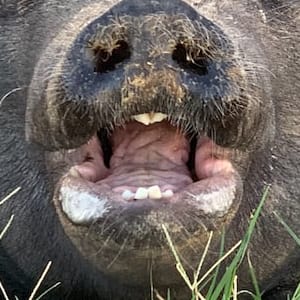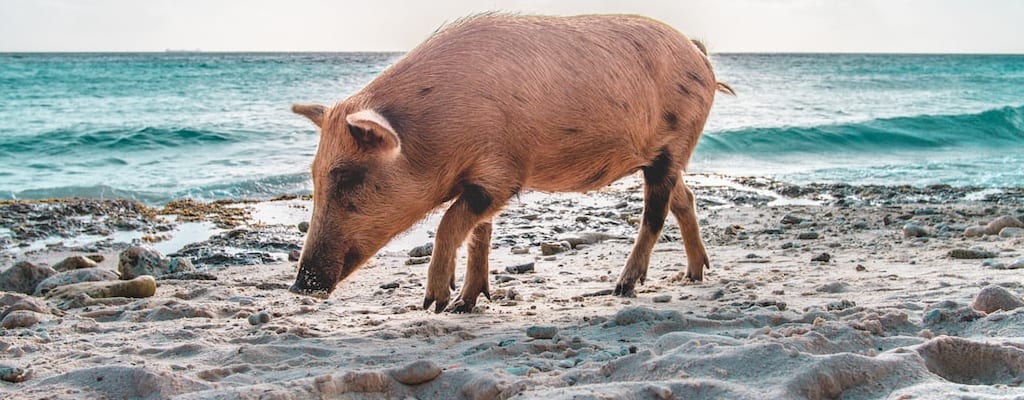couldn’t stop a pig in a passage: Idiom Meaning and Origin
What does ‘couldn't stop a pig in a passage’ mean?
The idiom "couldn't stop a pig in a passage" means that someone or something is completely unstoppable or uncontrollable.

Idiom Explorer
The idiom *pigs can fly* means that something is completely impossible. It is often used to express disbelief or to emphasize the unlikelihood of a situation or event.
The idiom "enough to choke a horse" means an excessive amount or quantity that is more than necessary or expected.
The idiom "dog that caught the car" refers to someone who has achieved a goal but is uncertain about what to do next or ill-prepared to handle the situation. It emphasizes the feeling of being overwhelmed or unprepared for the consequences of one's actions.
The idiom "dig one's heels in" means to refuse to change one's mind or course of action despite pressure or opposition.
The idiom "couldn't organise a piss-up in a brewery" means someone is extremely disorganized and unable to successfully plan or manage even the simplest tasks or events.
The idiom *could not get elected dogcatcher* means someone is very unpopular or unlikable, to the extent that they would struggle to win even the least prestigious position or office.
The idiom "come hell or high water" means that someone is determined to do something despite any difficulties or obstacles that may arise.
The idiom "choke off" means to stop or prevent something from continuing or progressing.
The idiom "cat in the meal-tub" means a hidden or unexpected problem or complication that arises suddenly and disrupts a situation or plan.
Unstoppable Pig
The idiom "couldn't stop a pig in a passage" is a colloquial expression that comes from British English. It describes someone or something that is completely ineffective or powerless. This idiom is often used to convey a sense of extreme inefficiency or lack of control over a situation or circumstance.
The origin of this idiom is uncertain, but it is believed to have originated in the early 17th century. The word "passage" refers to a narrow or restricted pathway. When someone "couldn't stop a pig" in a passage, it means they couldn't impede or obstruct its progress. This idiom gained popularity because of its vivid and humorous nature, which makes it easy to understand and remember.
The idiom "couldn't stop a pig in a passage" is mainly used in British English and may not be as widely known or used in other English-speaking regions. However, with the prevalence of media and the internet, it is possible that the idiom has become familiar to a broader audience.
This idiom is an example of figurative language, specifically a simile. Comparing a pig's unstoppable nature in a narrow passage emphasizes the absurdity and impossibility of halting its progress. This use of imagery adds a humorous and exaggerated element to the idiom, effectively conveying a sense of complete lack of control or influence.
Idioms are an integral part of language, reflecting the culture, history, and values of a particular group of people. "Couldn't stop a pig in a passage" showcases the ingenuity and creativity of the English language, as well as its ability to convey complex ideas concisely and vividly.
While this idiom may not have a widely recognized origin story or a long history of usage, it remains a quirky and memorable expression that effectively conveys a sense of powerlessness or ineffectiveness. It serves as a reminder of the rich tapestry of idiomatic expressions in the English language, each with its own unique story and character.
The idiom "couldn't stop a pig in a passage" bears resemblance to other idiomatic expressions, such as "pigs can fly," "can't help," and "a wild goose never laid a tame egg." These idioms also convey a sense of impossibility, powerlessness, or unpredictability.
"Pigs can fly" is used to describe an event or situation that is highly unlikely or impossible to happen. Just as a pig flying would be an extraordinary sight, this idiom highlights the absurdity or incredibility of a particular assertion or claim.
"Can't help" refers to a situation where someone is unable to prevent or control their own actions or emotions. It implies that the person is compelled or driven to do something, despite their best intentions or efforts to resist.
Similarly, "a wild goose never laid a tame egg" expresses the idea that something unpredictable or unconventional cannot produce an expected or conventional outcome. It highlights the inherent nature or behavior of something or someone, suggesting that they are incapable of conforming to expectations or norms.
These related idioms share the theme of impossibility or unpredictability, much like "couldn't stop a pig in a passage." Each idiom brings its own unique imagery and characteristics, contributing to the richness and variety of the English language.
Example usage
Examples of how the idiom "couldn't stop a pig in a passage" can be used in a sentence:
- Despite his efforts, the security guard couldn't stop a pig in a passage, as the playful animal ran past him and disappeared into the crowd.
- During the chaotic street parade, the police officers were overwhelmed and couldn't stop a pig in a passage, as various participants ignored traffic rules and caused mayhem on the roads.
- The inexperienced referee was unable to control the unruly soccer players and couldn't stop a pig in a passage, as they continually ignored his calls and engaged in unsportsmanlike behavior.
More "Humor" idioms



